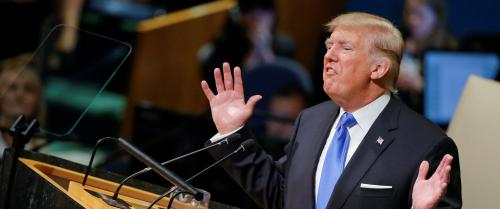This article originally appeared in the Financial Times on November 28, 2017.
The tax legislation now before Congress would fundamentally change the way that foreign profits of US multinationals are taxed, from a worldwide to a territorial approach. But the design of the new approach would encourage the offshoring of US jobs and factories.
Under the current worldwide approach, all profits earned by foreign subsidiaries of US companies are subject to tax by the US at a 35 percent rate, but only if and when they are repatriated to the country. By contrast, the Republicans are proposing to adopt a territorial system, under which the US would generally not tax profits of US companies earned in any foreign country. These profits would still be taxed by that foreign country at whatever rate it chooses.
While Republicans have pushed for a territorial system to make US companies more competitive abroad, they have publicly recognized that this system needs guard rails to prevent US multinationals from shifting facilities and profits to low-tax jurisdictions. In a territorial system, US companies would have a tremendous incentive to move factories to Switzerland, for example, where they could often pay an 8 percent tax rate.
Both the House and Senate bills try to establish such guard rails by adopting a minimum US tax with three components: a 10 percent minimum rate, which is applied to the aggregate foreign profits of a US company, after subtracting what Congress deems to be the company’s “routine” returns. Unfortunately, each of these three components is problematic.
First, both bills take an aggregate approach to determine whether the foreign tax on foreign profits of a US multinational exceed the specified minimum rate. Under an aggregate approach, the high taxes paid by US companies in certain countries would offset the very low rates they pay in other countries.
Suppose a US company derived $100m of foreign profits each year from countries with an average tax rate of 30 percent, such as France and Japan. It then could shift another $100 million in US profits to foreign countries with a zero tax rate, thus totally avoiding the minimum tax by achieving an aggregate tax rate of 15 percent.
Second, the proposed minimum tax rate is too low. A 10 percent rate for a minimum tax is clearly too low under an aggregate approach, as shown above. Even if the minimum tax were calculated on a country-by-country basis, a 10 percent rate would still be too low, as compared with the proposed US corporate rate of 20 percent.
Suppose Congress enacted a 10 percent minimum tax based on the foreign profits of a US company in each country. In that event, countries such as Poland and Singapore can be expected to offer a corporate tax rate at 10 percent to US companies if they would relocate their manufacturing or research facilities to these countries.
Third, the bills gut this 10 percent rate by applying it only to a company’s excess returns — above what the bills deem to be its “routine” returns. As a result, many US companies will easily circumvent this guard rail. If a company pays $8 million in foreign taxes on $100 million in annual foreign profits, based on foreign tangible assets of $400 million, that should trigger a minimum tax of 10 percent. However, if the bills allow a company to reduce its foreign profits by “routine” returns of $40 million, that $8 million in foreign taxes would clearly exceed 10 per cent of $60 million.
Moreover, the bills arbitrarily define routine returns as a specified percentage of a company’s tangible assets located overseas (10 percent of $400 million in the above example). This definition gives US companies a perverse incentive to move US tangible assets (plant, equipment and similar physical properties) to foreign countries.
In short, if Congress adopts a territorial system for corporate taxes, it needs effective guard rails to prevent US multinationals from moving more jobs and factories overseas. If Congress sets 20 percent as the corporate tax rate on US profits, it should apply a minimum tax to the extent that the foreign taxes of any US company in any foreign country are less than 15 percent of its actual profits there, without subtracting its “routine” returns.
Robert Pozen has been a nonresident senior fellow at Brookings since 2010. In 2015, he generously committed to endow the Director’s Chair for the Urban-Brookings Tax Policy Center. Until 2010, Pozen was executive chairman of MFS Investment Management and, before 2002, served in various positions at Fidelity Investments. He did not receive financial support from any firm or person for this article or from any firm or person with a financial or political interest in this article. He is currently not an officer, director, or board member of any organization with an interest in this article.






Commentary
Op-edTrump tax bills would push US jobs and factories abroad
November 29, 2017